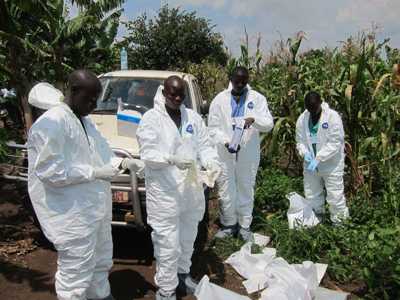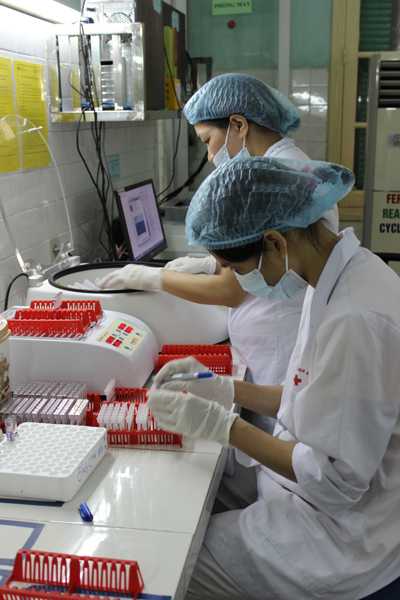U.S. safer when CDC works with other countries to fight infectious diseases
Projects in Asia and Africa offer model for greater health security in other nations
This website is archived for historical purposes and is no longer being maintained or updated.
Press Release
Embargoed until:Thursday, January 30, 2014 at 1:00 ET
Contact: Media Relations
(404) 639-3286

Uganda epidemiologists collect virus samples from the field, to test for deadly Ebola virus.
Photo: Justin Williams/CDC
According to an article in the Morbidity and Mortality Weekly Report (MMWR) released today by the Centers for Disease Control and Prevention (CDC), pilot projects between CDC and Uganda and CDC and Vietnam have resulted in improvements in disease detection and response that may serve as a model for increasing global health security in the rest of the world. Global health security – keeping the U.S. and the world safe and secure from infectious disease threats – is achieved by preventing, detecting and responding to outbreaks as early and effectively as possible.
During six months of intensive collaboration, CDC worked with Uganda’s Ministry of Health and Vietnam’s Ministry of Health to modernize diagnostic testing for high-risk pathogens, develop real-time information systems for faster outbreak response, and improve emergency operations procedures including safe packaging and transport of potentially infectious samples. Improvements include clinicians’ ability to report and track suspected high-risk pathogen cases by text message; expansion of specimen referral and transportation systems supported by the President’s Emergency Plan for AIDS Relief (PEPFAR); and confirmation of Zika virus, Crimean-Congo hemorrhagic fever virus, hepatitis E virus, meningococcal disease, yellow fever, and multidrug-resistant (MDR) and extensively drug-resistant (XDR) tuberculosis (TB) cases in Uganda
“The health security of the United States is only as strong as the health security of all nations around the world. We are all connected by the food we eat, the water we drink, and air we breathe,” said CDC Director Tom Frieden, M.D., M.P.H. “Stopping outbreaks where they start is the most effective and least costly way to prevent disease and save lives at home and abroad – and it’s the right thing to do. Progress in Uganda in less than a year shows how effective strategic investments can be.”

Lab workers in Vietnam run diagnostic tests.
Photo: Niki Pham/CDC Vietnam
Threats to global health security include new and re-emerging pathogens, increasing antibiotic resistance and intentionally created bioweapons. Although countries were required to meet updated World Health Organization (WHO) International Health Regulations (IHR) requirements for responding to public health emergencies by July 2012, less than 1 in 5 countries have been able to meet that level of preparedness.
The CDC global health security projects aimed to demonstrate that intensive efforts to improve surveillance, laboratory and emergency response systems in Uganda and Vietnam could contribute to meeting the IHR requirements. From March to September 2013, CDC and the ministries of health worked to strengthen disease detection and response capacities at local, regional and national levels, as well as at designated international ports, airports and ground crossings.
“Uganda and Vietnam have faced unique health challenges. Uganda has experienced Ebola, Marburg, cholera and MDR-TB outbreaks, and Vietnam has experienced SARS and H5N1 outbreaks,” said CDC Director for Global Health, Tom Kenyon, M.D, M.P.H. “Their success at rapidly adding new disease detection and response skills suggests that similar efforts could work for other countries. This is important in a world that regularly sees new pathogens, such as Middle East Respiratory Syndrome Coronavirus and H7N9 influenza.”
The Uganda project focused on three priority diseases—MDR and XDR-TB, cholera, and viral hemorrhagic fever caused by Ebola virus—to measure the project’s impact. In addition to performing a public health preparedness exercise, the Uganda Ministry of Health also activated its Emergency Operations Center (EOC) for a mass gathering at a solar eclipse in Northern Uganda and to support international airport screening for illness consistent with MERS-CoV infection among individuals returning from the Hajj.
For the Vietnam project, 30 Vietnamese officials received training in their country, at CDC’s EOC in Atlanta, and at the WHO Western Pacific Regional Office. Laboratory staff was trained in the following methods: WHO and CDC-approved real-time reverse transcription polymerase chain reaction (PCR) assay for H7N9 detection; pathogen testing using real-time PCR detection of enterovirus 71; and multiplex PCR for detection of seven respiratory pathogens. Project enhancements were built on existing Vietnam Ministry of Health systems and structures that will support Vietnam’s plans to develop their own EOC.
The Global Health Security demonstration projects culminated with a series of inter-related drills that measured improvements of laboratory testing, trained Uganda and Vietnam Ministry of Health staff, and confirmed interoperability of information and management systems contributing to meeting core IHR requirements. For more information about the agency’s global health security work, visit CDC's website.
Global Health Security, Securing our Global Health Borders, Disease can spread nearly anywhere within 24 hours http://www.cdc.gov/media/dpk/2013/dpk-2013-review.html#ghs.
- Page last reviewed: January 31, 2014 (archived document)
- Content source:
Error processing SSI file


 ShareCompartir
ShareCompartir